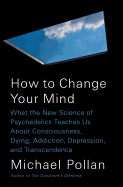
Journalist and author Michael Pollan (The Omnivore's Dilemma; Cooked) didn't consider taking LSD until he was nearly 60 years old. He had a mild experience with psilocybin mushrooms in his late 20s, but never had much interest in illegal drugs, nor introspection, religion or mysticism in any form. "But there are moments when curiosity gets the better of fear. I guess for me such a moment had arrived."
This curiosity resulted, among other more personal and intangible results, in How to Change Your Mind, a thorough and enlightening study of the history, science and personal experience of psychedelic drugs in the U.S. The invention of LSD in the 1950s sparked a revolution in brain science. Researchers discovered the role of neurotransmitters in the brain, and the neurochemical roots of many mental illnesses. Psychotherapists had remarkable results using psychedelic drugs in treatments. But as enthusiastic promoters of these substances spread them to the general unmonitored public, and the counterculture in particular, "the exuberance surrounding these new drugs gave way to moral panic."
Pollan interviews old and young researchers and "guides," and, with a long disclaimer on the copyright page, he describes his transformative guided personal experiences with LSD, psilocybin mushrooms and 5-MeO-DMT (the Toad). Of his mushroom experience he writes: "I honestly don't know what to make of this experience... I had felt the personhood of other beings in a way I hadn't before." Legal, expertly guided psychedelic therapies could be the future of mental health treatments and therapies as well as of the exploration of human consciousness. --Sara Catterall

